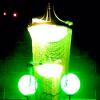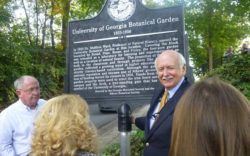Genevieve wasn’t completely hardhearted. She’d meant everything she said to Casey during the weekend they’d spent together before graduation. But then she met Caspian when she moved back to Athens, and things changed. That’s just how things went; after all, she’d liked guys before who didn’t like her back and it hadn’t ruined her life, so she wasn’t going to insult Casey by pitying him or beat herself up for changing her mind, even if it was awkward that he’d actually gone through with moving to Georgia. Anyway, there was always the possibility that they’d still get together later. She was really into Caspian, but she knew that wasn’t anything long-term. In any case, Casey was cool and good-looking; he wouldn’t have a problem fending for himself for a while in Athens. He probably had girls after him already. He had at Northwestern, too, and even though he’d acted so modest and self-effacing all the time, she knew he knew.
Still, ditching him at Jake’s party had been a crappy thing to do, and it was weighing on her mind the next morning when she left Caspian’s house on Boulevard and began the walk back to Dearing Street, where her parents lived. It was a crisp autumn morning, and she could hear the tailgaters and smell the barbecue smoke that wafted from their portable grills. She’d never been much into sports, but the roar of the downtown crowds and the sound of the pre-game shows floating from open windows reminded her of her childhood growing up in Athens. She felt old and somewhat decrepit behind her sunglasses as she approached Broad Street and confronted the red and black sea. In two weeks she wouldn’t be twenty-two anymore.
She wished she hadn’t drunk so much the night before.

Photo Credit: Kelly Hart
Go Dawgs! a group of frat guys in red pants bellowed at her as she passed. A couple of them snickered, and she was sure she heard the words “mom jeans” and “hipster.” She rolled her eyes.
The summer had been rough. As much as she’d missed Athens, she hadn’t fully appreciated what it would mean to live with her parents again, which she was doing while she waited tables and saved up to get an apartment with her friend Amanda. It was like being seventeen again; on her first night home, she’d been greeted by a looming stack of GRE prep books and guides to getting into grad school. And she and her parents were fighting again.
Her parents, Susan Cheng and David Farrell, were both professors, Susan in computer science and David in Classics, and they couldn’t fathom that their only offspring wouldn’t want to get a PhD herself, though Genevieve had never been the most academic person. Her grades had actually gone way up in college after she was finally diagnosed with ADD, which her parents wouldn’t let the school test her for when she was growing up. But that didn’t mean she was interested in four to six more years of school, let alone in becoming a teacher herself.
To their credit, they had actually encouraged her affinity for music, even if they would have preferred she like classical, or at least jazz, instead of rock. Susan and David were both accomplished pianists who practiced regularly; they’d met in college at University of California–Davis while they were both minoring in music. But they’d tried to turn music into one more area for Genevieve to achieve in, enrolling her in camps and setting up private lessons with instructors in the music school at UGA and insisting she participate in marching band, even though she loathed the smelly polyester uniforms and corny Led Zeppelin covers and would rather gouge her eyes out than watch a high school football game. They were upset when Daniel Ruiz was chosen as head of the percussion section instead of her, though she hadn’t even wanted the honor. As much as she hadn’t wanted to move to Chicago, getting away from her parents had been completely liberating, even though she loved them.
The latest blowout had taken place the afternoon before, when Genevieve told her parents that she didn’t want them to come to the Caledonia and see Midnight Jesus and that they shouldn’t have invited their neighbors and friends. “It’s not, like, a band concert or something,” she’d tried to explain. “The other people aren’t going to have their moms and dads there. It’s nothing against you guys, it’s just that it’s going to mostly be young people. We probably won’t even start playing until 11:30. It’s going to be really loud, and the lyrics might be sort of, um, offensive.” But as always happened, they ended up going around and around about it and Genevieve had lost her temper.
“I can’t believe you invited George and Helen,” she’d shouted, meaning their eighty-year-old down-the-street neighbors, professors emeriti in the English department, dear snowy-haired people who walked slowly down the street every morning with their canes and their ancient, slobbering King Charles spaniels, wearing cardigan sweaters buttoned up to their necks even in the middle of July. And her parents wanted them to come to a show where her band’s set was going to open with a song called “Cum Guzzler.”
“George and Helen are proud of you,” her mother shouted back.
“They’re adults,” her father said. “It’s not like they can’t handle hearing some risqué language.
George’s first book was on Tropic of Cancer.”
Genevieve didn’t know what Tropic of Cancer was. “Okay, but Mrs. Stevenson?” Mrs. Stevenson had been her middle-school Spanish teacher.
“Can’t you ever just let me have my own thing?” she pleaded, on the edge of tears. “I’m not in high school anymore.”
After more shouting, her parents finally said they’d call their friends and cancel, though this decision wasn’t reached until after Genevieve’s father cried and her mother yelled at her for making her father cry and for disappointing all the adults in her life who cared about her and for being ungrateful that she’d graduated from Northwestern with no student loans and for wasting her education by working at a restaurant. Miserable, she’d slunk up the stairs and spent the rest of the afternoon listening to 1980s hardcore and pounding on her drums until it was time to get ready for work. She avoided the windows, not wanting to see her parents weeding the garden in their sad straw sunhats, no doubt strategizing about what to do with her and her monstrous ingratitude. She hated being an only child.
When Casey had texted her that afternoon she’d felt a thrill of excitement—she still couldn’t believe he’d actually come to Athens—but then she’d remembered Caspian, and Casey seemed like just another person who wanted her to be different than she was, and it made her almost angry at him.
Like what you just read? Support Flagpole by making a donation today. Every dollar you give helps fund our ongoing mission to provide Athens with quality, independent journalism.










